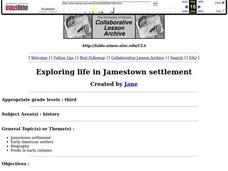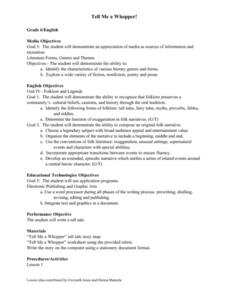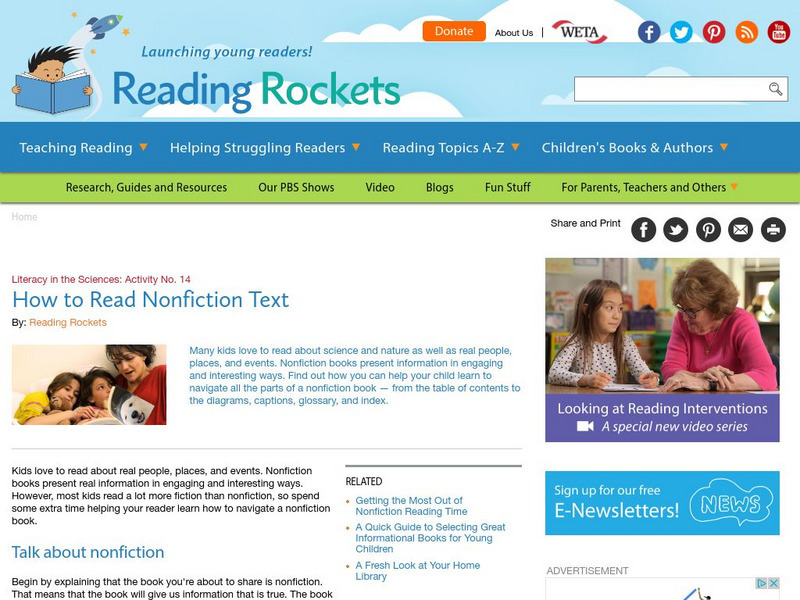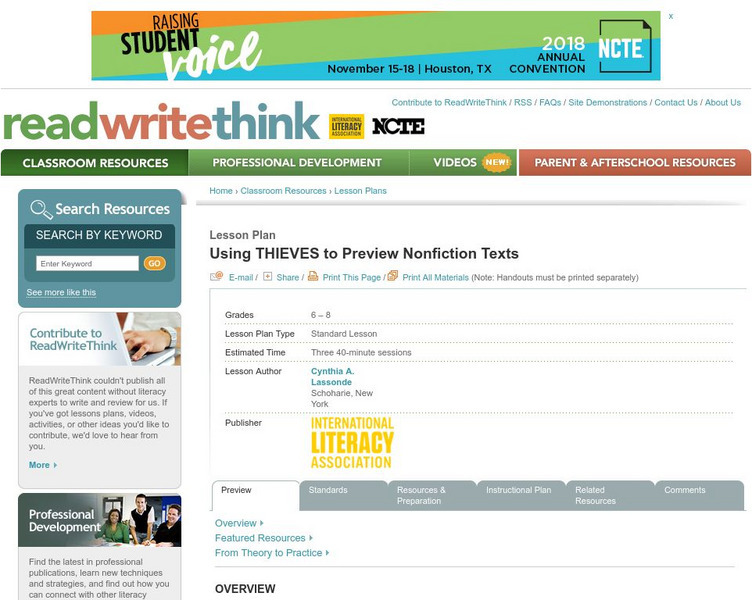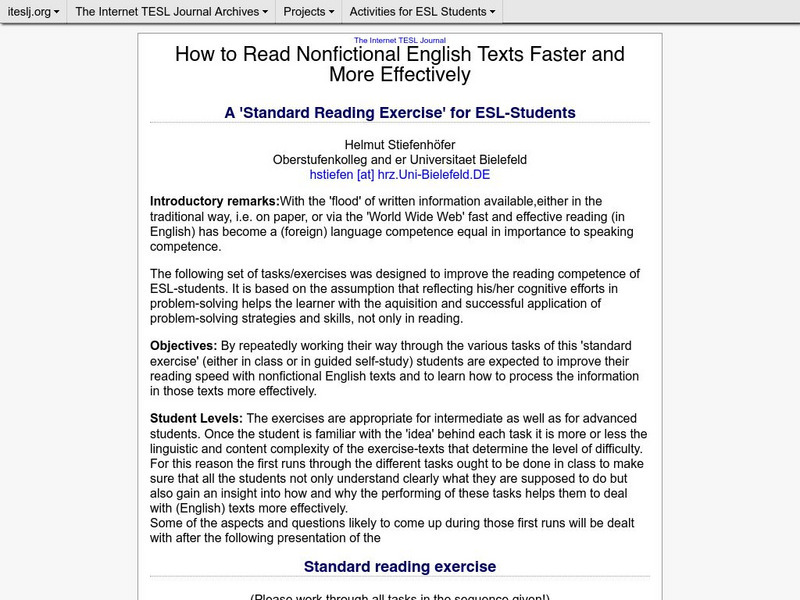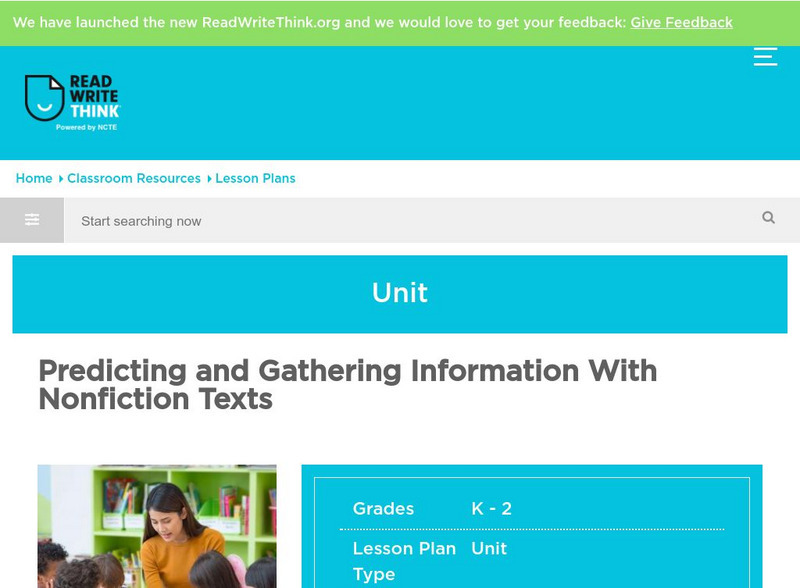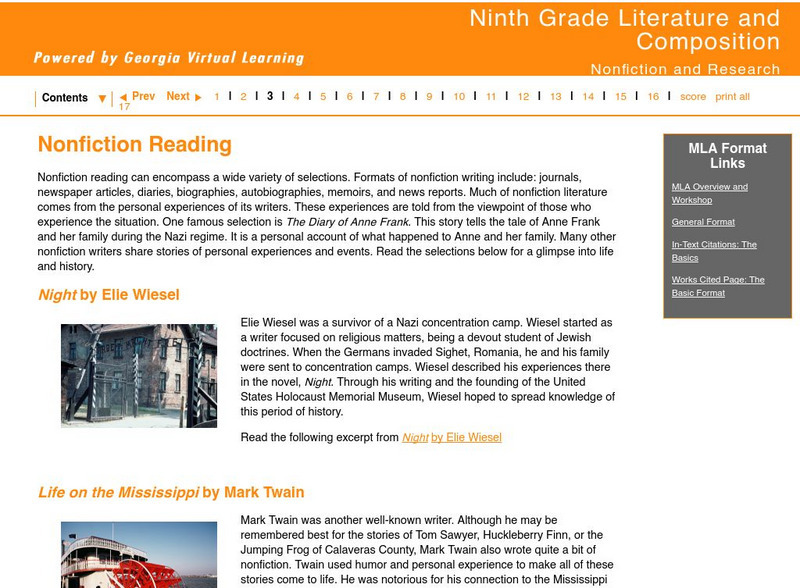Curated OER
Exploring Life in Jamestown Settlement
Third graders locate Jamestown settlement on a historical timeline and research colonial life. They name a restaurant, identify who their potential customers might be and prepare a typical colonial menu.
Curated OER
Exploring Life in Jamestown Settlement
Third graders examine life in early colonial settlements. Students investigate what settlers ate and create a menu for a fictitious restaurant in a settlement.
Curated OER
Tell Me a Whopper!
Sixth graders investigate tall tales as a literary genre. They listen to a number of tall tales to discover how exaggeration is used as a story element. They write and publish a tall tale using word processing software. They illustrate...
National First Ladies' Library
Are We There Yet?
Pupils study the wide-reaching effects of the Cold War, even to its involvement in domestic road construction. They research the National Defense Highway System (Eisenhower Highways) for information about the creation of the program, the...
National First Ladies' Library
Fitness for Life
Students discuss their favorite activities and determine which activities are suitable for older people. In groups, students research the benefits of aerobic exercises and the equipment needed. Students share their information with the...
National First Ladies' Library
Rock the Vote! But When?
Middle schoolers research and examine about voting turnouts in the United States and around the world. They assess about various aspects of the so-called "youth vote," and have an opportunity to consider the meaning of the vote in a...
British Library
British Library: 19th Century Non Fiction Texts: Work & Welfare
This thematic collection will allow students to read and understand 19th-century non-fiction texts, and support them in identifying key features for a range of genres, audiences, and purposes. Each source is accompanied by original...
British Library
British Library: 19th Century Non Fiction Texts: Gender, Behaviour & Etiquette
This thematic collection will allow learners to read and understand 19th-century non-fiction texts, and support them in identifying key features for a range of genres, audiences, and purposes. Each source is accompanied by original...
British Library
British Library: 19th Century Non Fiction Texts: Education
This thematic collection will allow students to read and understand 19th-century non-fiction texts, and support them in identifying key features for a range of genres, audiences, and purposes. Each source is accompanied by original...
British Library
British Library: 19th Century Non Fiction Texts: Crime & Punishment
This thematic collection will allow students to read and understand 19th-century non-fiction texts, and support them in identifying key features for a range of genres, audiences, and purposes. Each source is accompanied by original...
Reading Rockets
Reading Rockets: How to Read Nonfiction Text
Kids love to read about real people, places, and events. Nonfiction books present real information in engaging and interesting ways. However, most kids read a lot more fiction than nonfiction, so spend some extra time helping your reader...
ReadWriteThink
Read Write Think: Using Thieves to Preview Nonfiction Texts
Contains plans for three lessons that introduce a nonfiction prereading strategy with the acronym THIEVES, which stands for Title, Headings, Introduction, Every first sentence, Visuals and vocabulary, End Questions, and Summary. In...
Polk Brothers Foundation Center for Urban Education at DePaul University
De Paul University: Center for Urban Education: How Does Writer Organize Nonfiction Text?[pdf]
This poster contains writing craft questions for students to ask when reading nonfiction. This graphic organizer is a copyrighted material that may be used for educational purposes.
TESL Journal
The Internet Tesl Journal: Reading Nonfiction Texts Fast
Article lists a series of steps and tasks to make reading texts more efficient and clear. Written primarily for teachers of ESL students but tasks work for all students.
ReadWriteThink
Read Write Think: Animal Study From Fiction to Facts
Contains plans for five 50-minute lessons that ask students to compare and research information about animals from fiction and nonfiction texts. In addition to student objectives and standards, these instructional plans contains links to...
ReadWriteThink
Read Write Think: Reading/writing About Whales Using Fiction and Nonfiction Texts
Students will have a whale of a good time in this lesson in which they use fiction and nonfiction texts to write a letter to an online scientist.
ReadWriteThink
Read Write Think: Comprehending Nonfiction Text on the Web
Contains plans for three lessons designed to improve comprehension of nonfiction, especially nonfiction texts on the web. It focuses on identifying text features, locating specific information, and generalizing that information. In...
E Reading Worksheets
E Reading Worksheets: Nonfiction Passages and Functional Texts Worksheets
In this learning module, students will practice reading nonfiction passages. Students will also have the opportunity to answer multiple choice comprehension questions, answer short and extended response questions, and take a test. This...
ReadWriteThink
Read Write Think: Motivating Students to Read Nonfiction
This lesson plan deals with timelines in connection to nonfiction reading. Included in the lesson plan is an overview, practice, objectives, resources, preparation, and more.
ReadWriteThink
Read Write Think: Predicting and Gathering Information With Nonfiction Texts
Contains plans for eight short lessons that introduce nonfiction texts to second grade students. In addition to objectives and standards, this instructional plan contains links to sites used in the lessons as well as assessment and...
Georgia Department of Education
Ga Virtual Learning: Nonfiction and Research: Nonfiction Reading
This lesson focuses on students reading nonfiction works including excerpts from: Night by Elie Wiesel, Tuesdays with Morrie by Mitch Albom, and Life on the Mississippi by Mark Twain, and "Letter from Birmingham Jail" by Dr. Martin...
Reading Rockets
Reading Rockets: 103 Things to Do Before/during/after Reading
The highly-respected Reading Rockets program offers both teachers and students a toolkit of ways to connect more actively with the materials they read. Some of these techniques are specifically for fiction-reading, others are designed...
Polk Brothers Foundation Center for Urban Education at DePaul University
Depaul University: Center for Urban Education: Guide Nonfiction Reading
This site contains 17 nonfiction articles that are appropriate for students with a 6th grade reading level, as measured by the Fry Formula. Questions for each passage are provided. These graphic organizers are copyrighted and may be used...
Polk Brothers Foundation Center for Urban Education at DePaul University
De Paul University: Center for Urban Education: Nonfict Readers Analyze Structure/views[pdf]
This graphic organizer contains questions for students as they analyze any nonfiction text. Students will read closely to determine the text's structure, viewpoint, and tone. This graphic organizer is a copyrighted material that may be...



